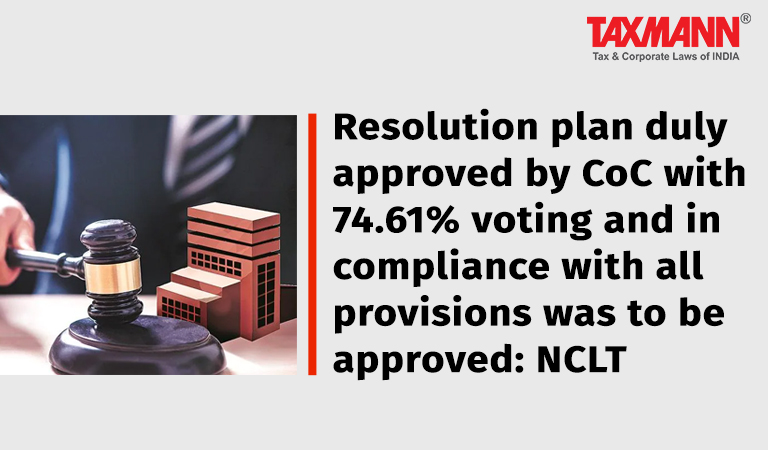Resolution plan duly approved by CoC with 74.61% voting and in compliance with all provisions was to be approved: NCLT
- Blog|News|Insolvency and Bankruptcy Code|
- 2 Min Read
- By Taxmann
- |
- Last Updated on 10 February, 2022

Case Details: Ashok Kumar Gulla v. Fedders Electric & Engineering Ltd. - [2022] 134 taxmann.com 271 (NCLT - Allahabad)
Judiciary and Counsel Details
-
- Dr. Deepti Mukesh, Judicial Member and Ms. Sumita Purkayastha, Technical Member
- Ms. Gunjan Jadwani, Adv. for the Applicant.
Facts of the Case
In the instant case, the application was filed by the Resolution Professional (RP) u/s 30(6) and 31 of the IBC, 2016 seeking the approval of the Resolution Plan submitted by IM+ Capitals Limited (“Successful Resolution Applicant”) in the CIRP of Fedders Electric & Engineering Limited (“Corporate Debtor”). The Resolution plan was duly approved by CoC with a 74.61% voting share.
NCLT observed that Resolution Professional (RP) had examined Resolution Plan and had found it to be in compliance with section 30(2), read with regulation 38. Further, in accordance with regulation 39(4), RP vide his Affidavit certified that Resolution Plan so submitted met all requirements of IBC and Regulations thereunder and further, the Resolution Professional had submitted compliance certificate in Form-H, inter alia, certifying eligibility of Resolution Applicant under section 29A and feasibility and viability of Resolution.
NCLAT Held
NCLAT held that the resolution plan, as approved by CoC, was found in accordance with section 30(2) read with section 31, thus, Resolution Plan was to be approved under sub-section (1) of section 31 and said Resolution Plan shall be binding on the corporate debtor, members, employees of the corporate debtor, creditors of the corporate debtor and other stakeholders involved in Resolution Plan.
Disclaimer: The content/information published on the website is only for general information of the user and shall not be construed as legal advice. While the Taxmann has exercised reasonable efforts to ensure the veracity of information/content published, Taxmann shall be under no liability in any manner whatsoever for incorrect information, if any.

Taxmann Publications has a dedicated in-house Research & Editorial Team. This team consists of a team of Chartered Accountants, Company Secretaries, and Lawyers. This team works under the guidance and supervision of editor-in-chief Mr Rakesh Bhargava.
The Research and Editorial Team is responsible for developing reliable and accurate content for the readers. The team follows the six-sigma approach to achieve the benchmark of zero error in its publications and research platforms. The team ensures that the following publication guidelines are thoroughly followed while developing the content:
- The statutory material is obtained only from the authorized and reliable sources
- All the latest developments in the judicial and legislative fields are covered
- Prepare the analytical write-ups on current, controversial, and important issues to help the readers to understand the concept and its implications
- Every content published by Taxmann is complete, accurate and lucid
- All evidence-based statements are supported with proper reference to Section, Circular No., Notification No. or citations
- The golden rules of grammar, style and consistency are thoroughly followed
- Font and size that’s easy to read and remain consistent across all imprint and digital publications are applied



 CA | CS | CMA
CA | CS | CMA
